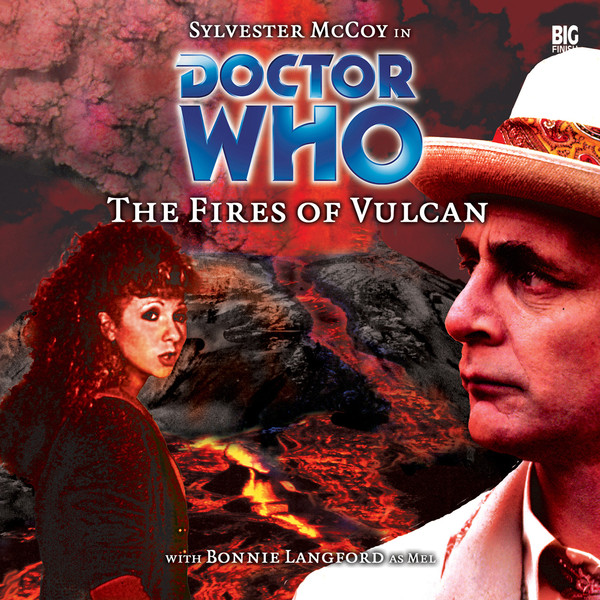
Released September 2000
Steve Lyons of Doctor Who novels fame pens his first script for Big Finish with ‘The Fires of Vulcan,’ reuniting Sylvester McCoy and Bonnie Langford as the Seventh Doctor and Mel, respectively. Unsurprisingly, given his previous bodies of work, Lyons focuses on characterization rather than putting all of the focus on the interesting historical setting, and Mel benefits greatly from the deeper exploration and time in the limelight, unquestionably rehabilitating the general opinion of her character as written for the classic series.
Ingeniously, the plot of the story revolves around a group of UNIT soldiers finding the TARDIS in the millenia-old ruins of Pompeii. It turns out that the Doctor has known about this for some time and has been trying to ignore the fact that it seems as though he will either be stranded or die in Pompeii at some point in his future. As a core concept, this works very well in adding a sense of uncertainty to proceedings as Vesuvius nears eruption since, even if every supporting character ends up perishing, there is still no certainty that the Doctor and Mel will be able to escape unscathed.
The Seventh Doctor on display here is certainly a more sombre and morose one than that traditionally paired with Mel, and it’s quite unsettling to hear McCoy so glumly portray his resignation to accepting predestination. Even as the TARDIS disappears, it’s disconcerting to hear the master manipulator of time broodingly saying that he cannot abide creating a paradox, although this is perhaps a stepping point to the darker character he would become as time progresses.
Truly, though this is a story about Mel as she is the one that, through persistence and an unwavering desire to live, eventually snaps the Doctor out of his funk and spurs him to come up with a ludicrously simple resolution that does not break any laws of time. Aside from writing Mel as the Doctor’s cheerful counterbalance, though, Lyons finds a way of highlighting all of Mel’s strong points while minimizing the more grating aspects. Mel does not have any real foreknowledge of the Pompeii era, and so her continued dismay and outright disgust while refusing to give up on her principles in order to fit in become a recurring source of amusement and danger. A lot is asked of Langford in her first reprisal of the role, but she absolutely delivers a standout performance.
Therein lies the big fault with ‘The Fires of Vulcan,’ however; Lyons spends so much time characterizing the leads that the supporting cast has little time for any development of its own. Steven Wickham’s gladiator Murranus fares best as he seeks to restore his honour by killing the Doctor after losing a game to him, adding a tangible danger to the tale that even an erupting Vesuvius does not quell. Popidius Celsinus and Eumachia, the other two important characters of note, both trail off into walking clichés by story’s end, the former as he continues to lust over Mel and the latter as an increasingly religious devotee who refuses to leave her god even as fire rains down around her. Andy Coleman and Lisa Hollander both give fine performances in the respective roles, but there’s just not that much to do with them.
The end result is a solid historical tale, but one that could have been much better by just devoting a little more time to rounding out the supporting cast. As it is, this release is worth listening to for Mel alone, and the Seventh Doctor’s melancholic nature definitely puts events in an unusual and interesting light leading up to a clever resolution.
- Release Date: 9/2000


Leave a Reply